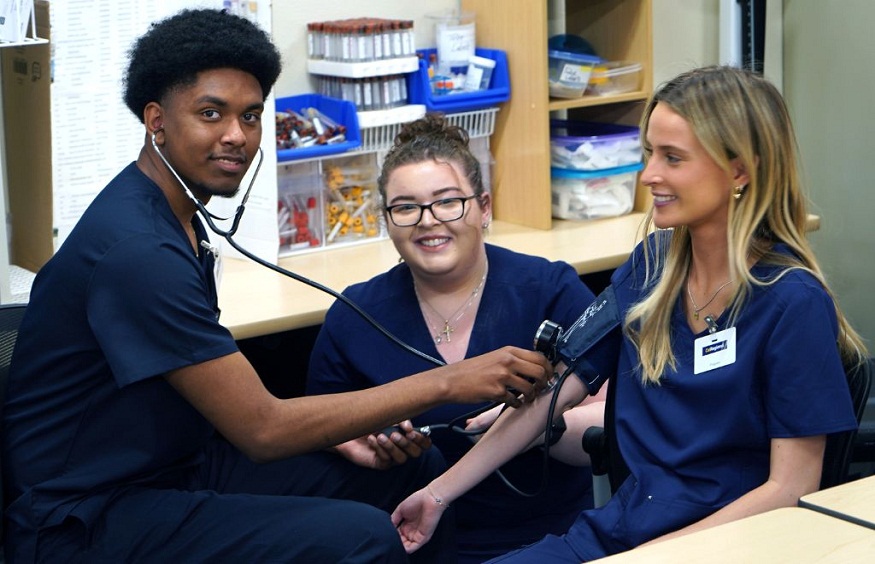
Explore Top Medical Assistant Programs in Houston for a Rewarding Career
Key Takeaways:
- Medical assistants play vital roles in healthcare, bridging administrative and clinical tasks.
- Key skills acquired in programs include phlebotomy, medical billing/coding, and electronic health records management.
- Accreditation from recognized bodies ensures quality education and facilitates eligibility for certification exams.
- Houston offers premier medical assistant programs at institutions like Houston Community College and Remington College.
- Cost-effective educational options are available, with financial aid and competitive tuition rates often offered.
- Both online and on-campus programs have unique benefits; choose based on personal learning styles and circumstances.
- Hands-on experience through clinical rotations prepares students for real-world responsibilities and builds confidence.
- Networking opportunities through programs can enhance career prospects and facilitate job placements.
- The demand for certified medical assistants is growing, driven by an aging population and increasing healthcare needs.
- Average salaries for medical assistants in Houston range from $38,000 to $45,000, with benefits enhancing job satisfaction.
- To land a first job, gain hands-on experience, network, polish resumes, and prepare for interviews.
The Essentials of Medical Assistant Programs
Understanding the Role of a Medical Assistant
The role of a medical assistant is multifaceted and vital in the healthcare industry. These professionals work alongside physicians, nurses, and other healthcare providers to ensure that medical facilities run smoothly.
Medical assistants are often the first point of contact for patients, as they handle scheduling appointments, managing patient records, and maintaining a welcoming environment in clinics and hospitals. They play a critical role in administrative tasks, including billing and coding, insurance verification, and patient follow-ups.
On the clinical side, medical assistants may assist in examinations, collect vital signs, prepare patients for procedures, administer injections, and perform basic laboratory tests. As healthcare continues to evolve, the role of medical assistants has grown more complex and demanding, requiring a strong blend of clinical knowledge and administrative skills.
Key Skills You’ll Gain in a Medical Assistant Program
Enrolling in a medical assistant program equips students with a diverse skill set that is essential in today’s healthcare landscape. Students typically engage in coursework that encompasses clinical skills such as phlebotomy, medical imaging, and basic lab procedures.
Additionally, administrative skills such as medical billing and coding, electronic health records management, and appointment scheduling are also covered. Critical thinking and problem-solving skills are emphasized, preparing students to handle various patient interactions and administrative challenges.
Furthermore, communication and interpersonal skills are honed through practical simulations and real-life scenarios, enabling graduates to interact effectively with patients, families, and healthcare teams. This combination of skills not only prepares medical assistants for day-to-day responsibilities but also enhances their employability and career advancement potential.
Accreditation: Why It Matters in Your Education
Accreditation serves as a benchmark for quality in education, particularly in the healthcare field where standards can directly impact patient care. Attending a program accredited by recognized bodies such as the Commission on Accreditation of Allied Health Education Programs (CAAHEP) or the Accrediting Bureau of Health Education Schools (ABHES) assures students that they are receiving an education that meets industry standards and requirements.
Accredited programs are typically recognized by employers and facilitate eligibility for certification exams, such as the Certified Medical Assistant (CMA) exam. Furthermore, many institutions with accredited programs have partnerships with healthcare providers, allowing students to participate in rewarding internships and gain hands-on experience that can lead to job opportunities post-graduation. The significance of accreditation cannot be overstated it is a vital factor for aspiring medical assistants to consider when selecting a program.
Top Ranked Medical Assistant Schools in Houston
Breaking Down Houston’s Premier Training Facilities
Houston is home to several premier medical assistant training schools that offer comprehensive programs designed to prepare students for successful careers. Institutions such as Houston Community College (HCC), Texas Southern University (TSU), and Remington College stand out for their robust curriculums, experienced faculty, and modern facilities.
For instance, HCC is well-known for its commitment to student success, offering both certificate and associate degree options that cover essential competencies in both the clinical and administrative aspects of medical assisting. Similarly, Remington College provides a fast-paced diploma program that caters to students eager to enter the workforce quickly, featuring a hands-on approach with dedicated classroom instruction and practical training. Each of these institutions has established a reputation for excellence and can be considered top choices for aspiring medical assistants in the Houston area.
Cost-Effective Programs That Deliver Value
Affordability is a key consideration for many prospective students exploring medical assistant programs. Fortunately, several institutions in Houston offer cost-effective programs that deliver exceptional value. For example, Houston Community College’s tuition rates are among the most competitive in the state, making it an accessible option for many students. Moreover, HCC provides financial aid options, including grants and scholarships, to help alleviate the financial burden.
Remington College also offers financing plans to ease tuition payments, and its short program duration allows graduates to enter the workforce sooner, which can translate into faster return on investment. Understanding the total cost of education, including books, materials, and possible lost income while studying, is crucial when evaluating options. Ultimately, selecting a program that balances quality education with affordability can set students on a path toward a successful career without incurring significant debt.
Online vs. On-Campus: Finding Your Perfect Fit
The debate between online and on-campus medical assistant programs is an important consideration for students looking to balance education with personal obligations. Online programs offer flexibility that allows students to learn at their own pace and on their own schedule, making them ideal for those who may be working or have family commitments. Many accredited online programs provide a robust curriculum and virtual clinical simulations to develop the necessary skills.
However, prospective students should be mindful that some programs may still require in-person components, such as clinical rotations, to ensure comprehensive training. Conversely, on-campus programs offer structured learning environments, immediate access to instructors, and opportunities for hands-on practice that some students may prefer. Ultimately, the choice between online and on-campus education depends on individual learning styles, life circumstances, and career goals. Evaluating these factors carefully will help students find the option that best suits their needs.
What to Expect During Your Medical Assistant Training
Hands-On Experience Through Clinical Rotations
One of the most valuable aspects of medical assistant training is the opportunity for hands-on experience through clinical rotations. These internships or externships allow students to work in real healthcare settings under the supervision of experienced medical professionals. Clinical rotations are essential for bridging the gap between theoretical knowledge and practical skills, providing students with invaluable exposure to the day-to-day responsibilities of medical assistants. Not only do students get to apply what they’ve learned in the classroom, but they also develop essential soft skills such as communication, teamwork, and problem-solving that are crucial in any healthcare role. Through direct interaction with patients and healthcare teams, students gain confidence in their abilities and learn to navigate the complexities of patient care effectively. This real-world experience equips graduates with a competitive edge when entering the job market.
Coursework Highlights: From Anatomy to Patient Care
The coursework in a medical assistant program is designed to cover a comprehensive range of subjects that equip students with the knowledge required to excel in their careers. Students typically delve into anatomy and physiology, understanding the human body’s systems and how to assist in patient care effectively. Coursework in medical terminology is crucial for effective communication within healthcare settings, while classes in pharmacology familiarize students with various medications and their administration. Health insurance and billing cycles are also explored, ensuring that graduates are well-versed in administrative responsibilities. Beyond the technical aspects, students are taught the importance of patient care, emphasizing empathy, respect, and professionalism in all interactions. This foundational knowledge not only prepares students for certification exams but also reinforces the critical role that medical assistants play in promoting positive patient experiences.
Networking Opportunities and Industry Connections
Building a professional network while training is a key component of success in any career, and medical assistants are no exception. Many medical assistant programs in Houston offer networking opportunities through guest lectures, career fairs, and collaboration with healthcare facilities. Students often have the chance to meet industry professionals who can provide insights into the profession and mentor aspiring medical assistants. Furthermore, schools may have partnerships with local hospitals and clinics, providing students with the opportunity to secure internships that can lead to job offers after graduation. Actively participating in these networks can significantly enhance career prospects, as referrals and recommendations from established professionals carry substantial weight in hiring decisions. Building relationships within the healthcare community also provides ongoing professional development and continuing education opportunities throughout one’s career.
Launching Your Career: Job Outlook for Medical Assistants in Houston
Growing Demand: Why Employers are Seeking Certified Pros
The job outlook for medical assistants in Houston is increasingly promising, with a growing demand for certified professionals to meet the needs of the expanding healthcare industry. As the population continues to rise, healthcare facilities are experiencing higher patient volumes, necessitating more support staff to ensure effective operations. Moreover, the aging baby boomer population is expected to increase the demand for medical services, further driving the need for qualified medical assistants. Employers are actively seeking certification, recognizing that candidates who have completed accredited programs and passed certification exams possess a higher level of competency and professionalism. The distinct advantage of becoming a certified medical assistant lies not only in job security but also in the potential for career advancement many employers prefer or require certification when hiring for medical assistant roles.
Salary Expectations and Benefits in the Houston Market
The salary outlook for medical assistants in Houston is competitive, with the average annual wage reflecting the skills and training that graduates have received. As of 2023, medical assistants in the greater Houston area earn an average of $38,000 to $45,000 per year, depending on factors such as experience, specialization, and specific employer. Entry-level positions typically start around $32,000; however, as professionals gain experience and potentially pursue additional certifications or specialized training, their earning potential can significantly increase.
In addition to base salaries, many medical assistant positions come with benefits such as health insurance, retirement plans, paid time off, and opportunities for continuing education reimbursement. This comprehensive compensation package enhances overall job satisfaction and contributes to a long-term career in this rewarding field.
Tips for Landing Your First Medical Assistant Job
Beginning a medical assistant career can be an overwhelming but exciting journey. To successfully land your first job, consider several key steps that can enhance your employability.
First, focus on gaining as much hands-on experience as possible during your training. Employers value candidates who can demonstrate practical skills and client interaction.
Second, invest time in polishing your resume and cover letter, tailoring them to highlight your educational background, certification, and any relevant experience, including internships. Third, leverage networking opportunities by connecting with classmates, instructors, and industry professionals through social media platforms like LinkedIn. Attend career fairs and professional organizations to expand your contacts further and learn about job openings.
Lastly, be prepared for interviews research common medical assistant interview questions, practice your responses, and come equipped with insightful questions to ask potential employers. With determination and preparation, aspiring medical assistants can effectively position themselves for career success.





